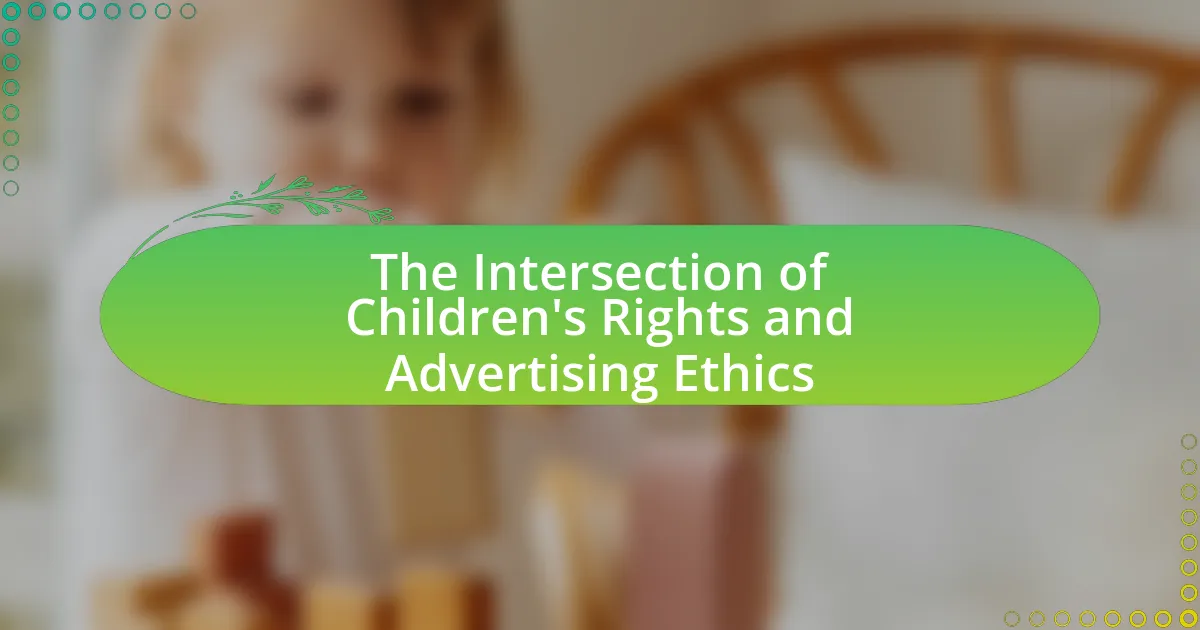The article examines the critical role of parental guidance in children’s advertising, highlighting how parents can mediate the effects of marketing messages on young audiences. It discusses the importance of parental involvement in fostering critical thinking and skepticism towards advertisements, particularly given children’s vulnerability to persuasive techniques. The article also explores the potential impacts of advertising on children’s behavior and attitudes, the strategies parents can employ to discuss advertising with their children, and the ethical considerations surrounding children’s advertising. Additionally, it addresses the influence of regulations on parental guidance and the resources available for parents to enhance their children’s media literacy regarding advertising.
What is the Role of Parental Guidance in Children’s Advertising?
Parental guidance plays a crucial role in children’s advertising by helping to mediate the impact of marketing messages on young audiences. Parents can influence their children’s understanding of advertisements, fostering critical thinking about consumerism and promoting healthy skepticism towards marketing tactics. Research indicates that children are particularly susceptible to advertising, often unable to distinguish between entertainment and promotional content, which underscores the necessity of parental involvement. For instance, a study published in the Journal of Advertising Research found that children exposed to parental discussions about advertising were better equipped to recognize persuasive intent, leading to more informed consumer behavior.
Why is parental guidance important in children’s advertising?
Parental guidance is important in children’s advertising because it helps protect children from misleading or inappropriate content. Children are particularly vulnerable to persuasive advertising techniques, which can influence their preferences and behaviors. Research indicates that children often lack the ability to critically evaluate advertisements, making them susceptible to manipulation. For instance, a study published in the Journal of Consumer Research found that children under the age of eight are unable to distinguish between program content and advertising, highlighting the need for parental oversight to help them navigate these messages. By providing guidance, parents can foster critical thinking skills and promote healthier consumption habits, ensuring that children are not unduly influenced by advertising.
What are the potential impacts of advertising on children?
Advertising can significantly influence children’s behavior, attitudes, and consumption patterns. Research indicates that children exposed to advertising are more likely to develop brand loyalty and preferences at an early age, which can lead to increased demand for unhealthy food products. A study published in the journal “Pediatrics” found that children who viewed food advertisements were more likely to choose unhealthy snacks over healthier options, demonstrating a direct correlation between advertising exposure and dietary choices. Additionally, advertising can shape children’s perceptions of social norms and values, often promoting materialism and unrealistic body images. This impact is particularly concerning as it can contribute to issues such as low self-esteem and unhealthy lifestyle choices among children.
How does parental involvement shape children’s understanding of advertisements?
Parental involvement significantly shapes children’s understanding of advertisements by providing critical context and guidance on media literacy. When parents actively engage in discussions about advertisements, they help children discern persuasive techniques, such as emotional appeals and misleading claims. Research indicates that children who receive parental guidance are better equipped to critically evaluate advertisements, as evidenced by a study published in the Journal of Advertising Research, which found that children exposed to parental discussions about media content demonstrated improved analytical skills regarding advertising messages. This involvement fosters a more informed perspective, enabling children to navigate the complexities of advertising effectively.
How do parents influence children’s responses to advertisements?
Parents significantly influence children’s responses to advertisements by shaping their attitudes and perceptions towards marketing messages. Research indicates that parental discussions about advertisements can enhance children’s critical thinking skills, enabling them to better understand persuasive techniques used in marketing. For instance, a study published in the Journal of Advertising Research found that children whose parents engage in conversations about advertisements are more likely to question the credibility of the messages and develop skepticism towards them. This guidance helps children differentiate between entertainment and marketing, ultimately affecting their purchasing decisions and brand preferences.
What strategies do parents use to discuss advertising with their children?
Parents use various strategies to discuss advertising with their children, including open dialogue, critical thinking exercises, and media literacy education. Open dialogue allows parents to create a safe space for children to express their thoughts and questions about advertisements, fostering understanding. Critical thinking exercises encourage children to analyze the intent behind ads, helping them discern persuasive techniques. Media literacy education equips children with the skills to critically evaluate advertising messages, enhancing their ability to recognize bias and manipulation. Research indicates that children exposed to discussions about advertising are better at understanding its persuasive nature, leading to more informed consumer behavior.
How does parental guidance affect children’s purchasing decisions?
Parental guidance significantly influences children’s purchasing decisions by shaping their preferences and understanding of consumer behavior. Research indicates that children often rely on their parents for cues on what products are desirable, as parents serve as primary role models in the shopping environment. A study published in the Journal of Consumer Research found that children whose parents actively engage in discussions about products are more likely to develop critical thinking skills regarding advertising, leading to more informed purchasing choices. Additionally, parental involvement can help children differentiate between needs and wants, further impacting their decision-making process.
What are the ethical considerations in children’s advertising?
Ethical considerations in children’s advertising include the protection of vulnerable audiences, truthfulness in messaging, and the potential for exploitation. Advertisers must ensure that their content does not manipulate children’s naivety or lack of experience, as children may not fully understand persuasive intent. Research indicates that children are particularly susceptible to advertising messages, which raises concerns about promoting unhealthy products, such as junk food, leading to negative health outcomes. Additionally, regulations like the Children’s Online Privacy Protection Act (COPPA) in the United States emphasize the need for transparency and parental consent in data collection practices related to children’s advertising. These ethical guidelines aim to safeguard children’s well-being and promote responsible advertising practices.
How do regulations impact parental guidance in advertising?
Regulations significantly shape parental guidance in advertising by establishing standards that protect children from misleading or harmful content. These regulations, such as the Children’s Online Privacy Protection Act (COPPA) in the United States, restrict the collection of personal information from children and mandate transparency in advertising practices. By enforcing these rules, regulators empower parents to make informed decisions about the media their children consume, ensuring that advertisements are age-appropriate and not exploitative. For instance, studies have shown that compliance with such regulations leads to a decrease in the exposure of children to inappropriate advertising, thereby enhancing parental control over their children’s viewing experiences.
What role do advertisers play in promoting responsible advertising practices?
Advertisers play a crucial role in promoting responsible advertising practices by ensuring that their campaigns adhere to ethical standards and regulations that protect consumers, particularly children. They are responsible for creating content that is truthful, not misleading, and appropriate for the target audience, which is especially important in children’s advertising to prevent exploitation and manipulation. For instance, the Children’s Advertising Review Unit (CARU) provides guidelines that advertisers must follow to ensure that advertisements directed at children are not deceptive and promote positive values. By complying with these guidelines, advertisers contribute to a safer advertising environment that prioritizes the well-being of young audiences.
How can parents effectively guide their children in navigating advertisements?
Parents can effectively guide their children in navigating advertisements by fostering critical thinking skills and encouraging open discussions about media content. By engaging children in conversations about the intent behind advertisements, parents can help them understand persuasive techniques and differentiate between needs and wants. Research indicates that children who receive parental guidance are better equipped to recognize advertising strategies, leading to more informed consumer choices. For instance, a study published in the Journal of Consumer Research found that children exposed to discussions about advertising were more skeptical of marketing messages. This approach not only enhances children’s media literacy but also empowers them to make conscious decisions regarding their consumption.
What resources are available for parents to educate their children about advertising?
Parents can utilize various resources to educate their children about advertising, including books, online courses, and educational websites. For instance, books like “The Advertising Effect: How to Change Behavior” by Adam Ferrier provide insights into advertising strategies and their impact. Online platforms such as Common Sense Media offer guides and articles that help parents discuss advertising with their children, emphasizing critical thinking skills. Additionally, organizations like the American Psychological Association provide research and resources that highlight the effects of advertising on children, enabling parents to engage in informed discussions. These resources collectively empower parents to foster media literacy and critical analysis in their children regarding advertising.
How can parents use media literacy programs to enhance their children’s understanding?
Parents can use media literacy programs to enhance their children’s understanding by actively engaging them in discussions about media content and teaching critical evaluation skills. These programs provide structured frameworks that help children analyze advertisements, recognize persuasive techniques, and differentiate between fact and opinion. Research indicates that children exposed to media literacy education demonstrate improved critical thinking skills and a greater ability to question the motives behind advertising messages. For instance, a study published in the Journal of Advertising Research found that children who participated in media literacy programs were 30% more likely to identify misleading advertising tactics compared to those who did not receive such education. This evidence underscores the effectiveness of media literacy programs in fostering a more discerning approach to media consumption among children.
What are some practical tips for parents to discuss advertising with their children?
Parents can effectively discuss advertising with their children by engaging them in conversations about the purpose and techniques of advertisements. One practical tip is to watch commercials together and ask children what they think the ad is trying to sell and how it makes them feel. This encourages critical thinking and awareness of persuasive techniques used in advertising.
Another tip is to explain the concept of target audiences, helping children understand that ads are designed for specific groups of people. This can be illustrated by discussing how different products are marketed to different age groups or interests.
Additionally, parents should encourage children to question the credibility of advertisements by discussing the difference between facts and opinions presented in ads. This can be reinforced by comparing advertisements with product reviews or consumer reports, which provide factual information about products.
Finally, parents can promote media literacy by guiding children to recognize the emotional appeals used in advertising, such as happiness or fear, and discussing how these emotions can influence purchasing decisions. This approach not only enhances children’s understanding of advertising but also equips them with skills to navigate media critically.






